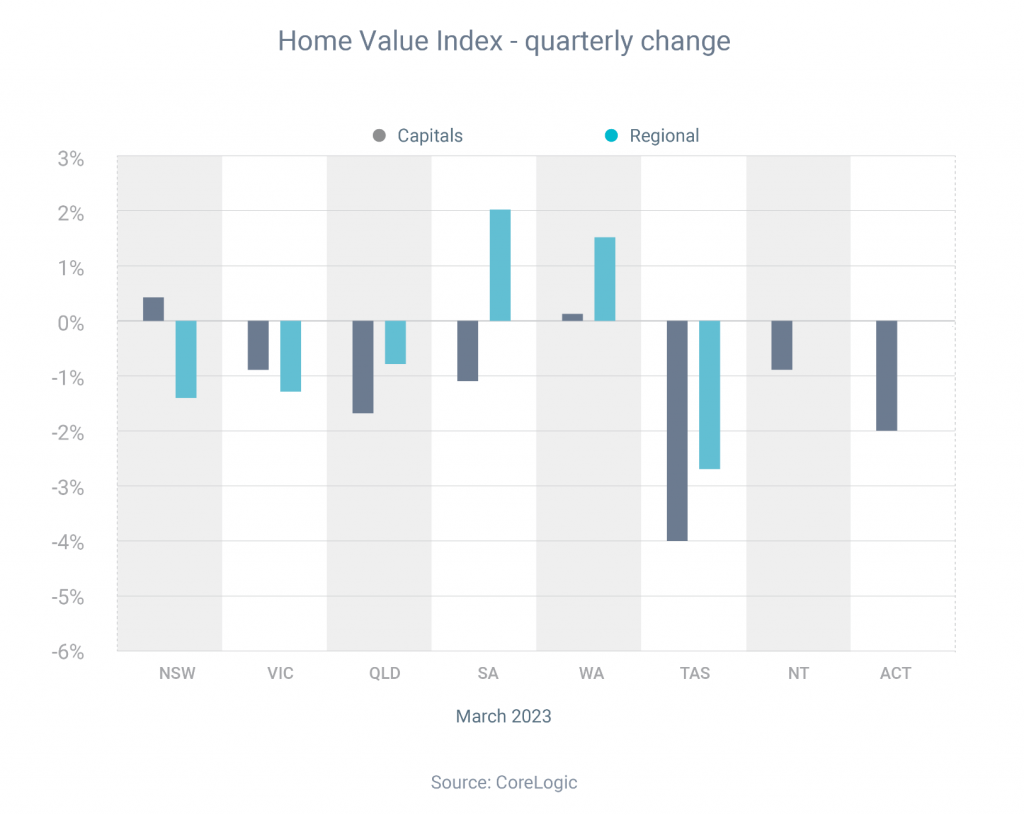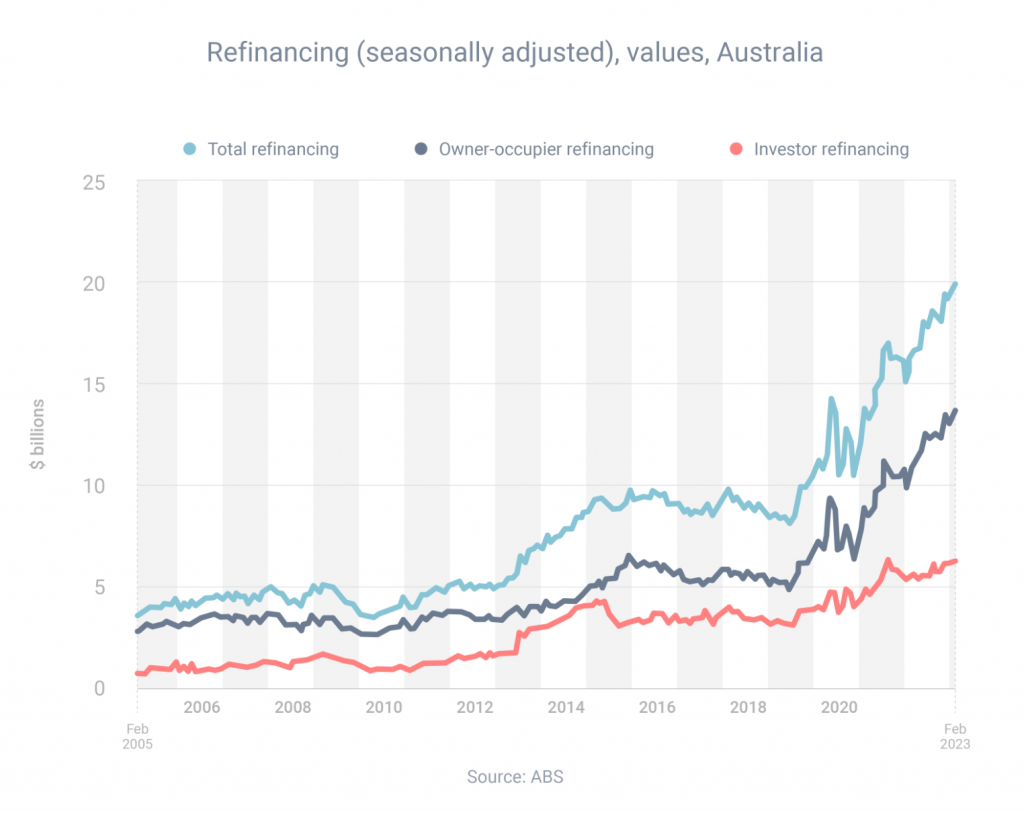Rateseeker Property News Round-up – April 2023

Much to the relief of many Aussie homeowners and borrowers the Reserve Bank of Australia (RBA) has held down the pause button on hiking interest rates further in April, however the property market brings us more news as it enters a new phase.
With property prices slumping over the last few months, many prospective buyers and sellers have been wondering how long this dip may last. Although providing some relief for buyers at the time, sellers have been holding on to their properties and waiting for the next property boom, affecting the stock of properties available for purchase on the market.
In March CoreLogic revealed a 0.6% increase, the first figure of growth in prices since April 2022, with economists suggesting that the property downturn may be over.
The number of Aussie homeowners who are taking charge of their long term mortgage savings and refinancing loans are also at the helm of loan activity. As the low interest rates at the start of the pandemic instigated the 24 month long refinancing boom, the Australian Bureau of Statistics (ABS) has recorded figures of $19.9 billion in refinanced loans in February 2023 – a new record.
The Australian Taxation Office (ATO) is also coming down heavy on property investors, employing the help of over 17 financial institutions with an aim to put investor tax returns under the microscope in an attempt to claw back over $1.3 billion in ‘missing’ taxes.
Scam activity has also been on the rise, with scammers concocting new ways of defrauding Aussies out of their hard earned dollars. Bank impersonation scams are a huge focus at the moment as Scamwatch and the Australian Competition & Consumer Commission (ACCC) reports over 14,603 reports and over $20 million in losses.

Could the property downturn be over?
New data from CoreLogic Australia suggests that the Aussie property downturn may be coming to an end, with property prices jumping 0.6% in March – the first monthly increase since April 2022.
Although prices increased in some major cities across the country ( Sydney, Melbourne, Perth and Brisbane), they did decrease in the four smaller capitals.
CoreLogic’s research director, Tim Lawless, explains that one reason prices are rising again is due to the extremely tight rental market, where accommodation is scarce and rents are rising rapidly.
This has encouraged some tenants who are aspiring homebuyers to switch from renting to buying, thereby increasing buyer demand.

Similarly, with net overseas migration at record levels and rising, there is a chance more permanent or long-term migrants who can afford to, will skip the rental phase and fast track a home purchase simply because they can’t find rental accommodation.
Tim Lawless – CoreLogic Research Director
Are you sick of rental increases and thinking about buying your own home? Get in touch with our expert brokers and we can help guide you through the process. We’ll help you determine how much you can borrow along with finding the perfect loan for your circumstances.
Refinancing activity at over $19 billion
Over the last two years, the Aussie refinancing boom has hit historical levels with current figures showing Aussies are seeking sharper rates now more than ever before.
Refinancing activity has significantly increased over the last 24 months from $13.7 billion worth in February 2021 to $16.2 billion in February 2022 and, now, a record $19.9 billion in February 2023 according to the latest data from the ABS.

The catalyst to the refinancing surge was primarily the historically low interest rates, which instigated borrowers to seek a sharper rate and lock in a more suitable fixed rate.
However, by May 2022 Aussies remained at the helm of the refinancing surge, trying to lock in low fixed rates as banks began to hike interest rates.
Undoubtedly, the cyclic nature of the property and finance market shows many changes in a short time, so if it’s been a few years since you’ve refinanced your home loan, there is a chance you’re paying far more than you should. Get in touch with our expert brokers today to explore a sharper rate for your loan and save big in the long term.

ATO to scrutinise property investor tax returns
A warning has been given to property investors around Australia as the Australian Taxation Office (ATO) revealed that it would scrutinise tax returns in an attempt to claw back an estimated figure of approximately $1.3 billion in missing taxes.
The ATO has made a statement to The Guardian confirming that it would implement “formal information gathering powers” to compel 17 financial institutions – including all the big four banks – to provide data on approximately 1.7 million property investors across Australia.
This means the ATO will be allowed to assess all the income an investor had earned and all the expenses they’d incurred over the course of a year, and to then compare that with their tax returns.
According to the ATO, the most common tax mistakes that property investors make are:
- incorrectly declaring improvements to be repairs rather than capital works
- not apportioning expenses for private use of the property
- either not apportioning or incorrectly apportioning the loan interest costs after refinancing for private purposes
For these reasons, property investors are strongly urged to seek professional help from a trusted and accredited accountant.

Protect yourself against bank impersonation scams
In 2023, scam messages and calls are all too common. The Australian Banking Association (ABA) has recently kicked off a new campaign to raise awareness about the ongoing scams.
Scams are at the forefront of fraud related reports with Scamwatch receiving 14,603 reports about bank impersonation scams in 2022, resulting in over $20 million in losses, according to the Australian Competition & Consumer Commission.
The ABA ads include these key messages:
- Bank impersonation scams: “Banks will never call you and ask you to transfer money to another account.”
- E-toll scams: “Never click on suspicious texts, links or emails.”
- Investment scams: “Always check you’re dealing with a legitimate organisation.”
- Invoice scams: “Never transfer money unless you’re certain it’s to the right person.”
Banks will never:
- Ask you to transfer funds to another account over the phone
- Send you unsolicited texts or emails that ask you to provide your account or personal details
- Ask for online banking passcodes or passwords over email, text or phone
- Ask for remote access to your computer
- Threaten to take immediate action on an issue
The ABA has urged consumers to question the authenticity of texts, emails or calls from people who claim to be from a bank or trusted organisation. The ABA has also highlighted the importance of registering a PayID (only through a bank, not a third party) and using it when available.
Consumers should also set up two-factor authentication for online banking for extra security, check the legitimacy of invoices or bills, and report any suspicious activity to their bank.
** General Advice Warning
The information provided on this website is general in nature only and it does not take into account your personal needs or circumstances into consideration. Before acting on any advice, you should consider whether the information is appropriate to your needs and where appropriate, seek professional advice in relation to legal, financial, taxation, mortgage or other advice.




